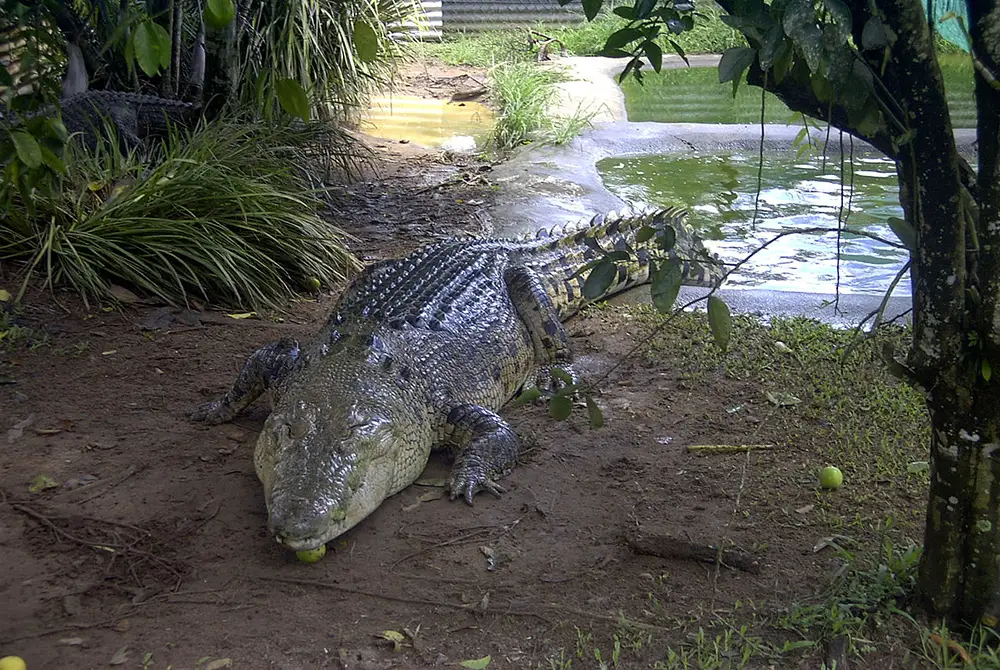The ancestors of today’s crocodiles colonized the seas during warm phases and became extinct during cold phases, according to a new Anglo-French study, which establishes the link between marine crocodilian diversity and the evolution of sea temperature over a period of over 140 million years.
The research, led by Jeremy Martin from the Université de Lyon, France and formerly form the University of Bristol, UK will be published this week in Nature Communications.
Today, crocodiles are ‘cold-blooded’ animals that usually reside in fresh water but with two notable exceptions, Crocodylus porosus and Crocodylus acutus occasionally venture into the sea. Crocodiles reside in tropical climates, and they are frequently used as markers of warm conditions when they are found as fossils.

Only 23 species of crocodiles exist today but once there were hundreds of species. On four occasions in the past 200 million years, major crocodiles groups entered the seas and proceeded to become extinct. It remains a mystery why they made these moves, and equally why they all eventually went extinct. This new study implies that crocodiles repeatedly colonized the oceans at times of global warming.
Lead author of the report, Dr. Jeremy Martin said: “We thought each of these evolutionary events might have had a different cause. However, there seems to be a common pattern.”
Dr. Martin, accompanied by a team of palaeontologists and geochemists from the Université de Lyon and the University of Bristol, compared the evolution of the number of marine crocodilian fossil species to the sea temperature curve during the past 200 million years. This temperature curve, established using an isotopic thermometer, is widely applied for reconstruction of past environmental condition and in this case, is based on the isotopic composition of the oxygen contained in the fossilized remains of fossil marine fish (bone, teeth, scales).
Co-author of the study, Christophe Lécuyer explained: “According to this method, it is possible to calculate the temperature of the water in which these fish lived by applying an equation linking the isotopic composition of the fossilized remains to the temperature of mineralization of their skeleton. The seawater temperatures derived from the composition of fish skeleton thus corresponds to the temperature of water in which the marine crocodiles also lived.”
The results display that colonization of the marine environment about 180 million years ago was accompanied by a period of global warming of the oceans. These first marine crocodilians became extinct approximately 25 million years later, during a period of global freezing. Then, another crocodilian lineage appeared and colonized the marine environment during another period of global warming.
The evolution of marine crocodilians is therefore closely linked to the temperature of their medium and provides information about their evolution and lifestyle, as in modern crocodilians, is constrained by environmental temperatures.
Nevertheless, one fossil lineage does not seem to follow this trend. Jurassic metriorhynchoids did not go extinct during the cold spells of the early Cretaceous, unlike the teleosaurids, another group of marine crocodilians. Surprisingly, metriorhynchoids only disappeared a few million years later. This exception will certainly provide new grounds for novel research, particularly into how the biology of this group adapted to life in the pelagic environment.
Professor Michael Benton from the University of Bristol, who also co-authored the study, said: “This work illustrates a case of the impact of climate change on the evolution of animal biodiversity, and shows that for crocodilians, warming phases of our earth’s history constitute ideal opportunities to colonise new environments.”
Contributing Source: University of Bristol
Header Image Source: WikiPedia




